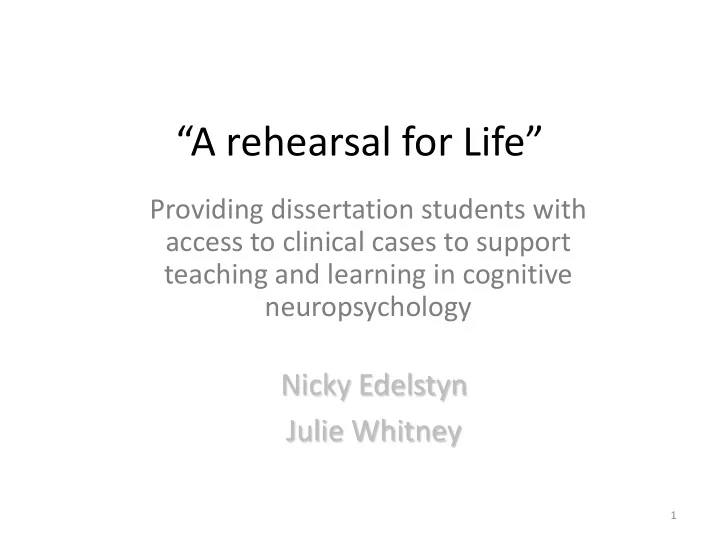

“A rehearsal for Life” Providing dissertation students with access to clinical cases to support teaching and learning in cognitive neuropsychology Nicky Edelstyn Julie Whitney 1
A rehearsal for Life • Brief intro to Psychology and Cognitive Neuropsychology • Single case studies • Innovation • Feedback • Student perspective 2
WHAT IS PSYCHOLOGY? • Understanding normal human behaviour • Variety of paradigms: – Psychoanalytic – Social – Developmental – Health – Cognitive – Cognitive Neuropsychological 3
Psychodynamic/Psychoanalytic 4
Social Psychology 5
Developmental Psychology 6
Health Psychology 7
Cognitive Psychology 8
Cognitive Neuropsychology Cognitive neuropsychology aims to understand • how the structure and function of the brain • relates to specific psychological processes. • It places a particular emphasis on studying the cognitive effects of brain injury or neurological illness • with a view to inferring models of normal cognitive functioning. 9
Cognitive Neuropsychology • Case study approach is central to cognitive neuropsychological research. • Exemplified by famous case published mid 19 th C. Phineas Gage. 10
Lots of published single cases... 11
YET OUR PSYCHOLOGY STUDENTS • On the 3 year DH BSc Psychology programme are entirely class-room based. • They have no formal exposure to patients during their period of study • Yet clinical (neuro)psychology remains one of the most popular areas of psychology to study at UG, PGT, PGR. 12
So, what’s the teaching innovation?? • Nothing particularly radical..... • Cross-fertilization from standard clinical teaching • Using real patients to bring cognitive neuropsychology “to life”! • Our students don’t have access to patients to see the sorts of phenomenology they read about • So, the purpose of applying to the Teaching Innovations Fund was get funding to cover travel expenses for patients to come to Keele to participate in my final year dissertation projects. 13
Dissertation projects provided students with exposure to: • Stroke patients with: – Everyday memory deficits – Attention deficits – Acalculia – Topographical memory deficits 14
FEEDBACK • Innovations project been extremely successful – External examiner comments – Student feedback 15
External Examiner comments • "The students producing the best work really were exceptional cases. The best project in areas of Cognitive/Experimental/Neuropsychology was a top-quality piece of work by Julie Whitney, providing evidence of excellent supervisory support (by Edelstyn), as well space for the student to contribute their own skill. ......... • The project is the pinnacle of the students’ degree, and the School should be commended on the extent to which students were able to apply their psychological research techniques and knowledge to novel issues in psychology." 16
Student perspective • Julie Whitney 17
Student perspective • My background • Working with Dr. Edelstyn: • Module Leader – Cognitive Neuropsychology • Dissertation supervisor • How I benefitted from the funding 18
Background • ‘Mature student’ • Recent graduate – Criminology and Psychology • Masters in Clinical Psychology here at Keele in September • Aiming to achieve a doctorate in psychology • Some experience of clinical issues – Parkinson’s Disease and psychoses 19
Work with Dr. Edelstyn • 3 rd Year ‘Special Option’ Cognitive Neuropsychology • Very popular option – complex and demanding • Range of disorders studied: • Stroke; Parkinson’s Disease • Agnosia; Capgras Delusion • Exciting, tangible area of psychology • Fast-moving research developments • Link with Clinical Psychology 20
3 rd Year ‘Special Option’ Cognitive Neuropsychology • Session with Dr. Perry, Consultant Clinical Neuropsychologist • Case study: stroke patient • Memory problems, irritable, loss of confidence • Diagnostic approach • Call for sensitivity • Rehabilitation, psychological adjustment • Comparison with approach in cog-neuro • Career options: • Securing a post as assistant clinical psychologist 21
3 rd Year ‘Special Option’ Cognitive Neuropsychology • Session with stroke patient • Face to face Q&A • Opportunity to use skills highlighted by Dr. Perry • Diagnostic approach • Sensitivity, avoid patronizing, avoid jargon • Rehabilitation, psychological adjustment 22
3 rd Year Dissertation • Topographical memory in a stroke patient • Patient and matched healthy participants • Route round unfamiliar environment, then test • Design challenges: • Participant ages and mobility • Face to face interaction • Weather! • Ethics 23
3 rd Year Dissertation • Comparison: sampling students • Findings significant – implications for ongoing research • Taste of research similar to that needed at post-graduate level • Real sense of achievement and personal responsibility • Exciting and enjoyable 24
In Conclusion…. • Well-constructed introduction to the various facets of ‘real life’ research • Improved understanding of qualities needed to deal with clinical cases • Opportunity to produce a dissertation which adds to the broader debate • Excellent basis for post-graduate work 25
Recommend
More recommend